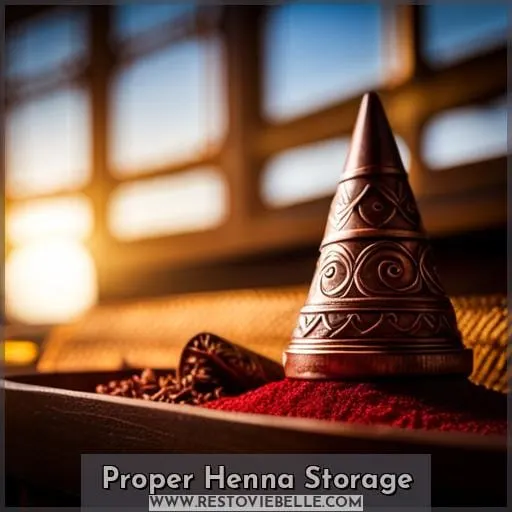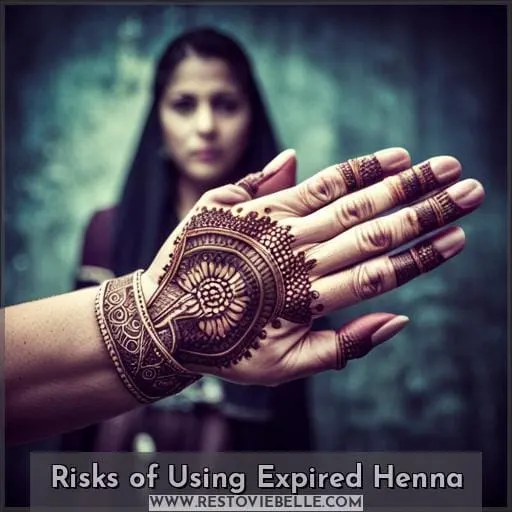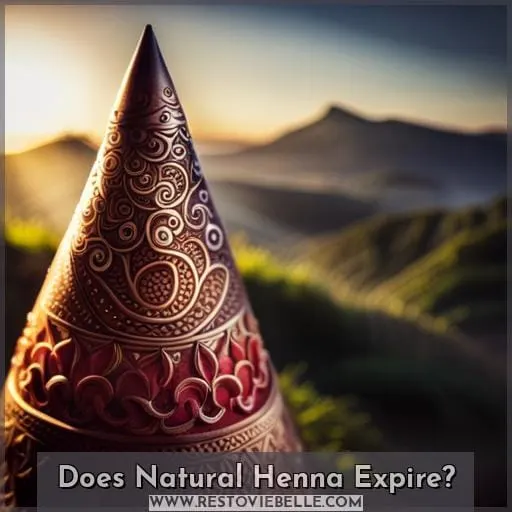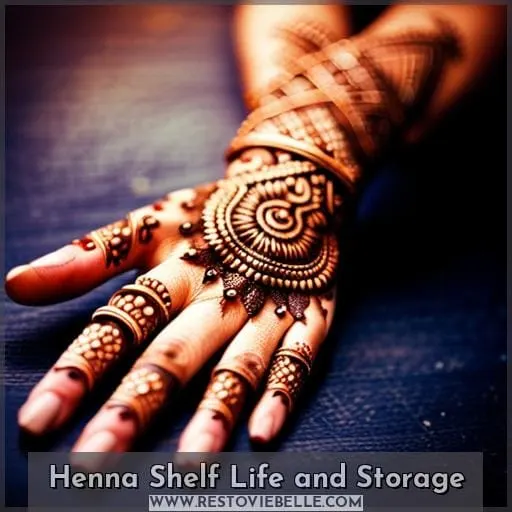This site is supported by our readers. We may earn a commission, at no cost to you, if you purchase through links.
 Curious if your henna stash has expired? Uncover the truth about henna expiration and how it affects its vibrant color.
Curious if your henna stash has expired? Uncover the truth about henna expiration and how it affects its vibrant color.
In this article, we’ll explore the shelf life of henna and provide tips on proper storage to keep your supply fresh for longer. Whether you enjoy using henna as body art or hair dye, understanding its expiration is crucial for achieving optimal results.
Get ready to unleash the power of timeless beauty with all-natural, long-lasting henna!
Table Of Contents
Key Takeaways
- Henna has a shelf life of 1-2 years when stored correctly.
- Expired henna may contain harmful bacteria and molds, posing health risks.
- Using old henna can result in itchiness and allergic reactions.
- Safety and quality should be maintained by always checking expiration dates when using henna.
Understanding Henna
Henna is a natural herb made from the leaves of the henna plant, and it’s used for body art and temporary hair dye in various cultures. This ancient practice of adorning the skin with intricate designs or enhancing hair color has its origins in Africa, India, and Pakistan but has gained popularity worldwide.
Henna can be applied as a paste or powder mixed with essential oils to create stunning designs that take about 45 minutes to an hour to dry before washing off. For hair dyeing purposes, henna is mixed into a paste consistency using water and essential oils before application.
Understanding how to store henna properly is crucial for maintaining its potency and effectiveness over time.
Making Henna
Now let’s dive into the process of making henna.
Henna is made from dried and ground henna plant leaves, which are then mixed with water and essential oils to create a paste.
This paste can be used for body art or as a temporary hair dye, offering versatility in its application.
Henna as Body Art
When making henna for body art, you frequently mix henna powder with water and essential oils to create the paste or powder.
Henna isn’t only used for temporary tattoos but also as a natural way to define and tint eyebrows.
Homemade henna can be crafted using acidic ingredients like lemon juice.
Additionally, henna can be used as a hair dye, providing rich brown or red tones without harsh chemicals found in commercial dyes.
Henna as Hair Dye
To make henna as hair dye, you’ll need a small amount of henna powder and essential oils.
Homemade henna can be used to achieve beautiful hair color while also benefiting your hair.
The acidic ingredients in the mixture help activate the natural pigments in the henna, resulting in vibrant hues.
However, it’s important to note that if left exposed to air for too long, homemade henna can dry out and become unusable.
Proper storage of unopened henna is crucial for maintaining its quality and effectiveness as a hair dye.
Henna Shelf Life
Now let’s talk about the shelf life of henna. It’s important to know how long store-bought henna cones, pre-mixed henna paste, and natural herbal henna can last before losing their effectiveness.
Shelf Life of Store-Bought Henna Cones
If you have store-bought henna cones, you may be wondering how long they can last before expiring.
- Proper storage is key for maintaining henna cone quality.
- Henna cones typically have a shelf life of 1-2 years when stored correctly.
- Exposure to light and heat can affect the longevity of henna dye.
- Sealing the cone in an airtight container helps prevent drying effects.
- Checking expiration dates and color changes is crucial for safety and effectiveness.
Shelf Life of Pre-Mixed Henna Paste
Now let’s delve into the shelf life of pre-mixed henna paste and how long it can remain effective for your skin and hair applications.
Properly stored, pre-mixed henna paste has a shorter shelf life compared to henna cones or powder.
To maximize its longevity, keep the paste sealed in an airtight container away from light and heat.
Shelf Life of Natural Herbal Henna
When storing natural herbal henna, it’s important to note that its shelf life can range from 6 to 12 months before it starts losing effectiveness. To maintain potency and ensure vibrant henna color, safe storage practices are crucial.
Store the henna in an airtight container away from light and heat to minimize expiration risks. Proper preservation techniques will help you achieve beautiful results when using natural henna for mehndi or dyeing eyebrows.
Proper Henna Storage
Proper henna storage is essential to maintain its potency and effectiveness.
When storing henna powder, it should be kept in a cool, dry place away from sunlight and moisture.
Pre-made henna products should be refrigerated in an airtight container, while henna solution should only be mixed for one application at a time to prevent bacterial growth.
Storage for Henna Powder
To properly store your henna powder, you should follow these guidelines for henna powder storage.
- Store it in a cool, dry place away from direct sunlight and moisture.
- Use containers with tight-fitting lids or resealable bags to prevent air exposure.
- When using pre-made henna products, refrigerate them in an airtight container.
It’s best to mix the henna solution for one application at a time to avoid bacterial growth and ensure proper preservation of the Henna Dye Longevity.
Storage for Pre-Made Henna Products
To properly store pre-made henna products, you should refrigerate them in an airtight container.
This is crucial for proper preservation and maintaining the freshness of the henna. By storing it in the refrigerator, you can prevent deterioration and extend its longevity.
Make sure to use containers with tight-fitting lids or resealable bags to prevent air exposure.
Following these storage solutions will help ensure that your pre-made henna products stay fresh and effective for as long as possible.
Storage for Henna Solution
To properly store your henna solution and ensure its longevity, follow these guidelines:
-
Preventing Drying:
- Store the henna solution in airtight containers to prevent evaporation.
- Keep the container away from direct sunlight and moisture.
-
Henna Cone Care:
- Seal opened henna cones tightly to avoid drying out.
- Store them in a cool, dry place or refrigerate for short-term use.
-
Thawing Henna:
- Allow frozen henna paste to thaw naturally at room temperature.
- Alternatively, speed up the process by placing it in warm water.
By following these storage practices, you can maintain the quality of your henna paste and ensure optimal results when applying designs on skin or hair without any issues of drying or loss of color intensity over time.
Risks of Using Expired Henna
Using expired henna poses several risks that you should be aware of.
First, expired henna may contain harmful bacteria and molds, which can lead to infections when applied on the skin.
Additionally, the coloring power of expired henna decreases or becomes ineffective, resulting in uneven and unsatisfactory results.
Lastly, using out-of-date henna can cause itchy and allergic reactions on your skin.
It’s important to always check the expiration date before using any henna products to ensure safety and optimal results.
Bacterial and Mold Contamination
Using expired henna can put you at risk of bacterial and mold contamination.
When henna reaches its expiration date, it becomes more susceptible to microbial growth, which can lead to infections and skin irritations.
Proper storage is crucial in preventing these risks.
By storing your henna in a cool, dry place away from moisture and sunlight, you can extend its shelf life and ensure the quality of the product for safe use without compromising skin staining or overall henna quality.
Decreased Coloring Power
If you use expired henna, the coloring power may decrease and result in uneven or less vibrant results.
The freshness of henna is crucial for achieving desired coloring effects, whether it’s on your skin or hair.
To ensure vibrant and long-lasting results, it’s important to avoid using deteriorating henna that has exceeded its shelf life.
Itchy and Allergic Reactions
If you use expired henna, there’s a risk of experiencing itchy and allergic reactions.
Using henna beyond its shelf life can lead to skin irritation and discomfort.
Expired henna may contain harmful bacteria or molds that can trigger allergic reactions in some individuals.
To ensure your safety and avoid these risks, always check the expiration date on your henna products before using them.
It’s important to prioritize proper storage and adhere to recommended usage guidelines for optimal Henna Safety.
What is Henna?
Now let’s dive into the topic of ‘What is Henna?’ and explore its origins and uses.
Henna, derived from the mignonette tree, is a natural coloring pigment that originated in the Middle East. The leaves are dried into a powder which is then mixed with water to create a paste used for temporary body art.
In addition to body art, henna can be used as an eyebrow tinting agent and even as a homemade hair dye. When using henna for hair coloring, it reacts with acidic ingredients like lemon juice or vinegar to release its color pigments effectively.
With its rich cultural history and versatility in artistic expression, henna has become popular among those who appreciate both tradition and self-expression through intricate designs on their skin or vibrant hues in their hair.
Using Old Henna
When using old henna, you may encounter:
- Reduced pigment
- Ineffectiveness for staining skin or hair
As henna ages, its color intensity diminishes, leading to less vibrant results. The potency of the dye can also decrease over time, resulting in a weaker stain on the skin or hair.
Using expired henna may have adverse effects such as:
- Uneven coloring
- Potential allergic reactions due to bacterial growth or contamination
To maintain the quality of your henna and ensure optimal results, it’s important to store it properly in an airtight container away from light and heat. Checking the expiration date before use is crucial for avoiding any negative outcomes associated with using old henna.
Does Natural Henna Expire?
Natural henna, unlike its synthetic counterparts, doesn’t technically expire due to the absence of preservatives and chemicals.
Proper storage is crucial to maintain the quality and potency of natural henna.
To ensure its longevity, store natural henna in an airtight container away from light and heat. This will prevent moisture absorption that can lead to mold or bacterial growth.
Additionally, check for any changes in color or smell as these may indicate contamination or expiration.
While natural henna may not have an official expiration date like other products, it’s recommended to use within 6-12 months for optimal results.
Henna Shelf Life and Storage
To ensure the longevity of your henna and maintain its effectiveness, it’s essential to understand its shelf life and proper storage techniques.
Henna has a shelf life that can vary depending on the type of henna product you have.
Store-bought henna cones typically last 1-2 years when stored correctly, while pre-mixed henna paste may have a shorter shelf life due to additives.
Natural herbal henna usually lasts 6-12 months before losing its effectiveness.
Proper storage involves sealing the product in an airtight container away from light and heat to prevent color changes or contamination.
By following these guidelines for storing your henna properly, you can ensure that it remains effective for longer periods and enjoy all the benefits of beautiful Hennas staining designs without any safety concerns or issues with quality maintenance.
Frequently Asked Questions (FAQs)
Can I use expired henna for body art or hair dye?
Expired henna may be ineffective for body art or hair dye. It can lose color intensity and potentially cause adverse reactions.
For optimal results, it’s best to use fresh henna within its recommended usage timeframe.
How can I tell if henna has gone bad or expired?
If henna has lost its vibrant color, turned moldy or smells off, it may have expired.
Expired henna lacks the power to create stunning body art or dye your hair effectively.
Can I extend the shelf life of henna by storing it in the freezer?
To extend the shelf life of henna, store it in the freezer.
Freezing henna can help maintain its potency and effectiveness for a longer period, ensuring that you have quality henna for your desired applications.
Is it safe to use henna that has changed color?
Using henna that has changed color isn’t safe. It could indicate contamination or expiration, leading to ineffective results and potential allergic reactions.
Always check for color changes before using henna.
Can I mix old henna powder with fresh powder for better results?
Mixing old henna powder with fresh powder won’t necessarily result in better results. The effectiveness of henna can decrease over time, so it’s best to use fresh powder for optimal color and staining.
Conclusion
To sum it up, henna does expire, and it’s important to be aware of its shelf life for optimal results.
Proper storage is key to preserving the vibrancy and effectiveness of henna, whether it’s used for body art or hair dye.
[Keypoints]Expired henna can lead to:
- Bacterial and mold contamination
- Decreased coloring power
- Itchy and allergic reactions
So, make sure to check the expiration date and follow the recommended storage guidelines to ensure your henna stays fresh and ready to unleash its timeless beauty.















